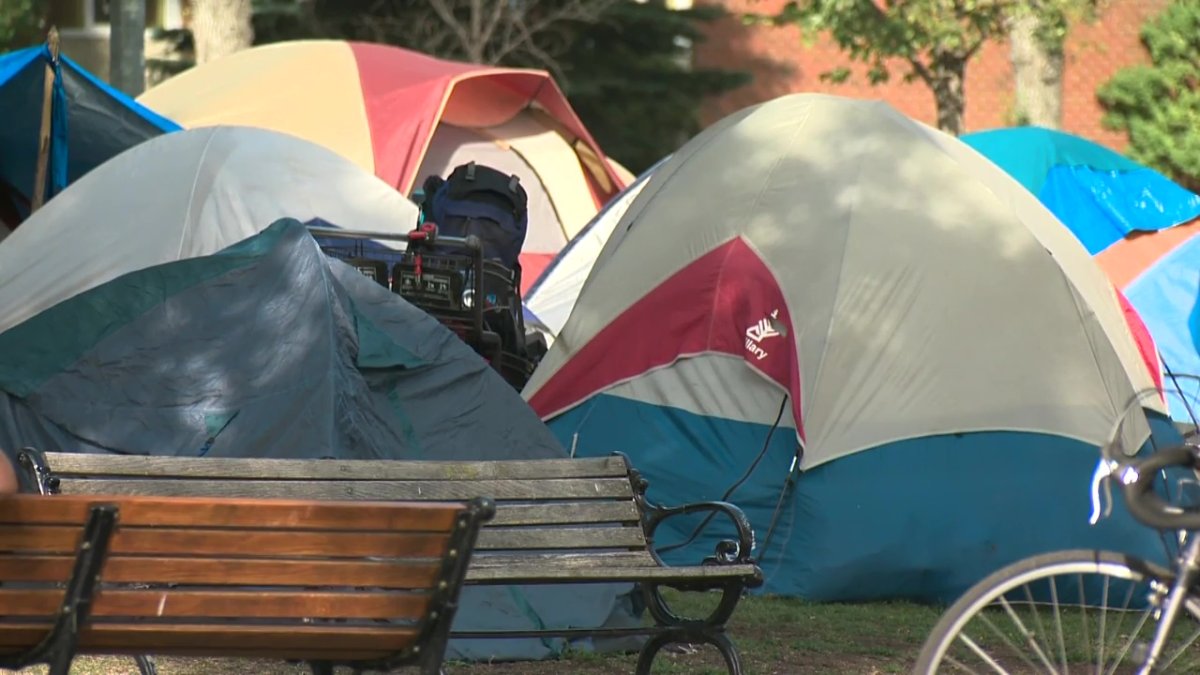The City of Edmonton introduced a new plan for managing homeless encampments on Wednesday.

According to a news release from the city, the strategy took key lessons learned in 2020 and includes three types of responses.
The focus is to more quickly connect people with social and housing resources, remove encampments within two weeks and not allow large, more permanent ones to establish.
“We’ll work with those individuals in those encampments to find them appropriate shelter as opposed to in an encampment,” Rob Smyth, the deputy city manager of the citizen services department, said Wednesday.
The Encampment Response Team will continue its work responding to encampments ruled low risk based on the severity of risk — like size, location and proximity to schools and parks.
If, after an investigation, an encampment is determined to be high risk, it will be elevated to the accelerated response process for closure led by peace officers and the Edmonton Police Service. Those living at the site will be offered information on shelter and transportation options before the site is closed, the new release said.
Any encampment deemed to be the highest risk will be further escalated to a committee of administrative executives. That committee is co-chaired by the city manager and EPS chief who will determine the response.
The city considers an encampment higher risk if it is near a park or school, adjacent to any buildings, or ones that pose significant fire hazards.

Get daily National news
“We really do want to respond in a much more strong way in a short amount of time to, hopefully, prevent those high-risk camps from surfacing,” Smyth said.

According to the city, the goal of the strategy is to connect people to housing and support, while discouraging the establishment of large encampments that have “negative health and safety impacts on encampment occupants and the surrounding community.”
According to Smyth, the city will respond to encampments as quickly as it can.
“As those camps get acknowledged or seen, our peace officers will then work with EPS and go into the camp and talk to the individuals who are there and indicate they have to relocate and they’ll provide some housing options for them but, in a short amount of time, we want to work with those camps to remove them, basically.”
Balancing compassion for those living rough with the effects on the community will be the first priority for the city, Smyth said.
“The impact on communities is not insignificant. So we have to manage both those sides and we believe the plan that we have in place, that we talked to council today about, is a very strong plan to move forward.”
While encampments have always been present in areas like the river valley, they were thrust into the spotlight last year with the creation of two larger camps in public parks.
Camp Pekiwewin was located in the Rossdale neighhourhood across the street from RE/MAX Field while another one was set up in Wilbert Mcintyre Park in Old Strathcona.
The Old Strathcona camp — which moved to Light Horse Park after being told to vacate the park — was closed Nov. 5 by city police and peace officers.
Camp Pekiwewin was dismantled Nov. 12 when city officials and police moved in. The area is currently fenced and Smyth said it will stay that way this summer.
Transportation to city shelters was provided when both camps were taken down.

Smyth said the city currently has “adequate” resources to be able to manage encampments with this plan, but that could change.
“We want to be far more proactive than we have been and move forward. If things get more challenging than we’re thinking, then we’ll look internally at how we can mobilize more workers.”
On Oct. 30, the city opened a temporary shelter at the Edmonton Convention Centre in response to the COVID-19 pandemic. In March, city council voted the shelter will remain open until April 30.


_848x480_1397405763961.jpg?h=360&w=540&crop=1&quality=70&strip=all)



Comments